 The joyful Christmas season comes with a lot of cakes and gifts, cribs and carols, Santa Claus, Christmas trees and colorful decorations of lights. Indeed, nowadays Christmas is identified only with these external signs and celebrations. What is the real meaning of Christmas? Why is it celebrated in such a way all over the world? What does it mean to say incarnation? Can a God be a human? These questions trigger us to go deep into the Mystery of the Incarnation of Jesus. How to enter into the greatest mystery that the world has ever seen in history? St Ignatius of Loyola in his Spiritual Exercises introduces in the second week, the Contemplation of the Nativity of Jesus to the retreatant to enter into this mystery of Incarnation.
The joyful Christmas season comes with a lot of cakes and gifts, cribs and carols, Santa Claus, Christmas trees and colorful decorations of lights. Indeed, nowadays Christmas is identified only with these external signs and celebrations. What is the real meaning of Christmas? Why is it celebrated in such a way all over the world? What does it mean to say incarnation? Can a God be a human? These questions trigger us to go deep into the Mystery of the Incarnation of Jesus. How to enter into the greatest mystery that the world has ever seen in history? St Ignatius of Loyola in his Spiritual Exercises introduces in the second week, the Contemplation of the Nativity of Jesus to the retreatant to enter into this mystery of Incarnation.
The exercise of contemplation given by St Ignatius is not just meditative thinking on the theme of Nativity but through our imagination we become an active participant in the particular scene with thoughts and emotions in the presence of Holy persons. Indeed, at the end of the day, He asks us to do the same using our five senses to get into a deeper union of the mystery we are contemplating. While explaining Ignatian contemplation, I would like to share my personal experience. St Ignatius asks us not to see the birth of Jesus as a historical event that happened two thousand years before but as a reality happening here and now.
In contemplation, St Ignatius starts with the composition of the place, imagining and seeing mentally the place where the event is taking place, nine-month pregnant Mary with Joseph with a donkey moving from Nazareth to Bethlehem for the census. Looking a little more deeply into the details like the distance, the roads, mountains and valleys they cross and the place Jesus was born whether it is big or small. Then, it is the most interesting part, inserting yourself into the history or into the scene of contemplation. Looking at Mary, Joseph and Jesus, imagining ourselves as a poor servant and deeply gazing at them and serving them in a most reverential manner. In order to receive some spiritual fruits, I am very attentive to the words of these people and also to the actions of these people. To be born in this poor lowly state, these holy men were travelling day and night with hunger and thirst, cold winter and heavy sun and all these things are happening to me. Finally, I enter into colloquy with any of the holy persons, touching and kissing the baby Jesus. Actually, here we are not praying with any words but being present with Jesus very closely with our hearts and minds in imagination.
This is one of the peak experiences for me during the retreat of thirty days of the Spiritual Exercises. I was very much impressed and inspired by the humility, accepting the vulnerability and identification of Jesus after the contemplation. What a memorable journey with Mother Mary and Joseph! I was guiding the donkey, conversing with Mother Mary, fetching water from the well and preparing the tent at night. She never treated me as a servant but always as a son. How much love and care, Joseph showed towards Mary and to safeguard the Holy Child. After this contemplation only, my devotion towards Joseph has begun. Mother Mary was very much suffering during the journey, fainting and vomiting but she never grumbled about the discomfort. When we reached Bethlehem, nobody gave us a place to stay. Mother Mary was in labour pain, Joseph left Mary with me to go to search for a place. Everyone was gazing at us but none helped to find a place. At last, we found a dirty stinky cowshed full of rubbles. Mary was crying aloud in pain; I prepared hot water and soaked the cloth to ease the delivery. I could imagine, Jesus learned from Mary the meaning of passion. I was ready there to do anything for Mother Mary and Joseph. After a long struggle, she gave birth to Jesus, the only Son of God. His legs first touched the cow shit.
 I could not control my emotions when I saw Jesus to be in such a lowly condition. The mighty God who has created heaven and earth, mountains and valleys is born in such a place, full of rubbish, stinking smell of cows’ excreta. What a poverty! Such a powerful and omnipotent God is lying like any other child, depending on human help for its needs, What humility! Though He is the mightiest God, He did not open his mouth besides crying for milk. What a vulnerability he has assumed! A God who depends on humans for any of their needs. It’s incredible! These thoughts disturbed me much. St Ignatius here makes us to belong these things by saying, everything for me. At this moment, I become emotionally, and rationally connected to the person of Jesus. He has incarnated for me; He has assumed himself to be born in such a lowly state for me. Jesus humbled himself to the human being and the world for me. Jesus identifies Himself with such a poor condition of place and people. Jesus emptied Himself from such a mighty godly state to a state of vulnerability and dependence. From this experience of contemplation of Nativity, I learned that coming down or emptying oneself for the life of others is Christmas, identifying myself with the poor and vulnerable is Christmas,
I could not control my emotions when I saw Jesus to be in such a lowly condition. The mighty God who has created heaven and earth, mountains and valleys is born in such a place, full of rubbish, stinking smell of cows’ excreta. What a poverty! Such a powerful and omnipotent God is lying like any other child, depending on human help for its needs, What humility! Though He is the mightiest God, He did not open his mouth besides crying for milk. What a vulnerability he has assumed! A God who depends on humans for any of their needs. It’s incredible! These thoughts disturbed me much. St Ignatius here makes us to belong these things by saying, everything for me. At this moment, I become emotionally, and rationally connected to the person of Jesus. He has incarnated for me; He has assumed himself to be born in such a lowly state for me. Jesus humbled himself to the human being and the world for me. Jesus identifies Himself with such a poor condition of place and people. Jesus emptied Himself from such a mighty godly state to a state of vulnerability and dependence. From this experience of contemplation of Nativity, I learned that coming down or emptying oneself for the life of others is Christmas, identifying myself with the poor and vulnerable is Christmas,
Let my prayer for this Christmas be,
Lord give me the grace to accept my vulnerability, let me incarnate and come down from my pride honour and self-reliance. The grace to perceive and identify you in the poor, the humble, the homeless and the vulnerable people. Fill me with the grace of Humility, Poverty, Incarnating and self-emptying love.
Frankly Jayanth SJ
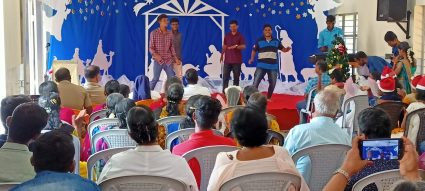 On this occasion of Christmas season, with great joy, we the Missionary Sisters of Incarnation together with our inmates and their family members and our benefactors, celebrated the Christmas program at St. Charles Home, Tamil Nadu on 22nd Dec at 11.30 am. We invited Rev. Fr. Madhan, the correspondent of Bishop Arockiaswamy B.Ed. College as our Chief Guest and Paster Stephen, the Paster of Sahaya Nager AG Church and Mr.Vijai, Sub Inspector of Rajakamangalm who were our Special Guest.
On this occasion of Christmas season, with great joy, we the Missionary Sisters of Incarnation together with our inmates and their family members and our benefactors, celebrated the Christmas program at St. Charles Home, Tamil Nadu on 22nd Dec at 11.30 am. We invited Rev. Fr. Madhan, the correspondent of Bishop Arockiaswamy B.Ed. College as our Chief Guest and Paster Stephen, the Paster of Sahaya Nager AG Church and Mr.Vijai, Sub Inspector of Rajakamangalm who were our Special Guest.  All our Chief Guests and Special guest were impressed by the cheerfulness and the programs of our dear children who are intellectually Disabled. This is the joy that we must learn from these special children and bring to others. Through the programme, we could see the possible effort and the dedication of all the sisters and the staff who are involved in their growth and education. We thank all our well-wishers, friends and relatives. May the infant Jesus bless you all and give you peace, joy and prosperity through this great festival of Christmas.
All our Chief Guests and Special guest were impressed by the cheerfulness and the programs of our dear children who are intellectually Disabled. This is the joy that we must learn from these special children and bring to others. Through the programme, we could see the possible effort and the dedication of all the sisters and the staff who are involved in their growth and education. We thank all our well-wishers, friends and relatives. May the infant Jesus bless you all and give you peace, joy and prosperity through this great festival of Christmas. The joyful Christmas season comes with a lot of cakes and gifts, cribs and carols, Santa Claus, Christmas trees and colorful decorations of lights. Indeed, nowadays Christmas is identified only with these external signs and celebrations. What is the real meaning of Christmas? Why is it celebrated in such a way all over the world? What does it mean to say incarnation? Can a God be a human? These questions trigger us to go deep into the Mystery of the Incarnation of Jesus. How to enter into the greatest mystery that the world has ever seen in history? St Ignatius of Loyola in his Spiritual Exercises introduces in the second week, the Contemplation of the Nativity of Jesus to the retreatant to enter into this mystery of Incarnation.
The joyful Christmas season comes with a lot of cakes and gifts, cribs and carols, Santa Claus, Christmas trees and colorful decorations of lights. Indeed, nowadays Christmas is identified only with these external signs and celebrations. What is the real meaning of Christmas? Why is it celebrated in such a way all over the world? What does it mean to say incarnation? Can a God be a human? These questions trigger us to go deep into the Mystery of the Incarnation of Jesus. How to enter into the greatest mystery that the world has ever seen in history? St Ignatius of Loyola in his Spiritual Exercises introduces in the second week, the Contemplation of the Nativity of Jesus to the retreatant to enter into this mystery of Incarnation. I could not control my emotions when I saw Jesus to be in such a lowly condition. The mighty God who has created heaven and earth, mountains and valleys is born in such a place, full of rubbish, stinking smell of cows’ excreta. What a poverty! Such a powerful and omnipotent God is lying like any other child, depending on human help for its needs, What humility! Though He is the mightiest God, He did not open his mouth besides crying for milk. What a vulnerability he has assumed! A God who depends on humans for any of their needs. It’s incredible! These thoughts disturbed me much. St Ignatius here makes us to belong these things by saying, everything for me. At this moment, I become emotionally, and rationally connected to the person of Jesus. He has incarnated for me; He has assumed himself to be born in such a lowly state for me. Jesus humbled himself to the human being and the world for me. Jesus identifies Himself with such a poor condition of place and people. Jesus emptied Himself from such a mighty godly state to a state of vulnerability and dependence. From this experience of contemplation of Nativity, I learned that coming down or emptying oneself for the life of others is Christmas, identifying myself with the poor and vulnerable is Christmas,
I could not control my emotions when I saw Jesus to be in such a lowly condition. The mighty God who has created heaven and earth, mountains and valleys is born in such a place, full of rubbish, stinking smell of cows’ excreta. What a poverty! Such a powerful and omnipotent God is lying like any other child, depending on human help for its needs, What humility! Though He is the mightiest God, He did not open his mouth besides crying for milk. What a vulnerability he has assumed! A God who depends on humans for any of their needs. It’s incredible! These thoughts disturbed me much. St Ignatius here makes us to belong these things by saying, everything for me. At this moment, I become emotionally, and rationally connected to the person of Jesus. He has incarnated for me; He has assumed himself to be born in such a lowly state for me. Jesus humbled himself to the human being and the world for me. Jesus identifies Himself with such a poor condition of place and people. Jesus emptied Himself from such a mighty godly state to a state of vulnerability and dependence. From this experience of contemplation of Nativity, I learned that coming down or emptying oneself for the life of others is Christmas, identifying myself with the poor and vulnerable is Christmas,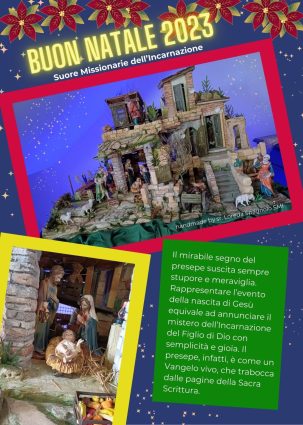 “Natale è una storia al di là della storia,
“Natale è una storia al di là della storia, La freschezza della giovinezza è come la bellezza di un giardino pieno di fiori: se i fiori sono colorati il giardino appare ancora più bello. Con questa immagine possiamo descrivere la crescita umana e spirituale di noi giovani Suore Missionarie dell’Incarnazione; come ci esorta la Serva di Dio, Madre Carla Borgheri: «Il nostro sia un “sì” generoso, totale, gioioso. Se dobbiamo donare a Dio un fiore colto nel nostro giardino, doniamolo subito, appena reciso, non dobbiamo tenerlo in mano, pensarci sopra, altrimenti perde la sua freschezza, il suo profumo e non è più presentabile. Un’anima missionaria custodisce, dentro di sé, il desiderio insopprimibile di portare Cristo alle anime, senza chiedere nulla per sé, né quanto ciò le possa costare» (Dio Solo, p.146). Per essere portatrici di Cristo nel mondo e per poterLo donare agli altri, dobbiamo essere riempite di Cristo; inoltre è molto importante prendersi innanzitutto cura di se stesse per potersi prendere cura degli altri.
La freschezza della giovinezza è come la bellezza di un giardino pieno di fiori: se i fiori sono colorati il giardino appare ancora più bello. Con questa immagine possiamo descrivere la crescita umana e spirituale di noi giovani Suore Missionarie dell’Incarnazione; come ci esorta la Serva di Dio, Madre Carla Borgheri: «Il nostro sia un “sì” generoso, totale, gioioso. Se dobbiamo donare a Dio un fiore colto nel nostro giardino, doniamolo subito, appena reciso, non dobbiamo tenerlo in mano, pensarci sopra, altrimenti perde la sua freschezza, il suo profumo e non è più presentabile. Un’anima missionaria custodisce, dentro di sé, il desiderio insopprimibile di portare Cristo alle anime, senza chiedere nulla per sé, né quanto ciò le possa costare» (Dio Solo, p.146). Per essere portatrici di Cristo nel mondo e per poterLo donare agli altri, dobbiamo essere riempite di Cristo; inoltre è molto importante prendersi innanzitutto cura di se stesse per potersi prendere cura degli altri.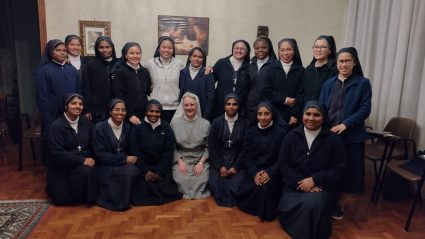 Abbiamo compreso bene che la conoscenza di se stessi non è un punto da raggiungere, ma un processo che dura per tutta la vita. In questo processo le emozioni sono la nostra forza interna più grande, e sono quelle che ci distinguono dalle macchine permettendoci di sognare, sperare fiorire ed amare. In questo modo la cura di me stessa è paragonabile alla cura della nostra casa e questo diventa indispensabile, perché la nostra casa, il nostro corpo è il luogo in cui il Signore vuole venire ad abitare per portare la salvezza a noi e, attraverso di noi, agli altri. Come ci ricorda la Serva di Dio Carla Borgheri: “Tutta la nostra giornata deve essere un continuo fiorire di atti virtuosi, affinché possa trasformarsi in un vaso profumato di presenza divina. Questo lavoro assiduo, quotidiano ci renderà spiritualmente più sensibili, capaci di comprendere e sentire in noi i desideri del Signore, per viverli intensamente”.
Abbiamo compreso bene che la conoscenza di se stessi non è un punto da raggiungere, ma un processo che dura per tutta la vita. In questo processo le emozioni sono la nostra forza interna più grande, e sono quelle che ci distinguono dalle macchine permettendoci di sognare, sperare fiorire ed amare. In questo modo la cura di me stessa è paragonabile alla cura della nostra casa e questo diventa indispensabile, perché la nostra casa, il nostro corpo è il luogo in cui il Signore vuole venire ad abitare per portare la salvezza a noi e, attraverso di noi, agli altri. Come ci ricorda la Serva di Dio Carla Borgheri: “Tutta la nostra giornata deve essere un continuo fiorire di atti virtuosi, affinché possa trasformarsi in un vaso profumato di presenza divina. Questo lavoro assiduo, quotidiano ci renderà spiritualmente più sensibili, capaci di comprendere e sentire in noi i desideri del Signore, per viverli intensamente”.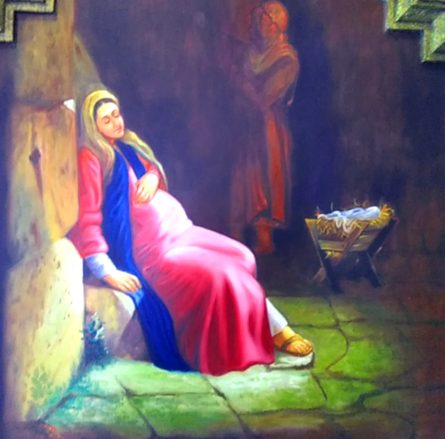 Ma il Natale è anche la Cometa, quella Luce che illumina il mondo, e che solo il tenero Bambino di Betlemme porta con sé ogni 25 dicembre, il buio si è dissolto, l’umanità non è più sola!
Ma il Natale è anche la Cometa, quella Luce che illumina il mondo, e che solo il tenero Bambino di Betlemme porta con sé ogni 25 dicembre, il buio si è dissolto, l’umanità non è più sola! With His Grace 25 Years
With His Grace 25 Years They are very grateful to all the people who accompanied them in these 25 years of life consecrated to God for others, in this great family of Missionary sisters of Incarnation.
They are very grateful to all the people who accompanied them in these 25 years of life consecrated to God for others, in this great family of Missionary sisters of Incarnation.
 A heartfelt thank you to all the sisters, Fathers and parishioners who participated in our joy. For all of them we ask the Lord to bless them and to grant them peace.
A heartfelt thank you to all the sisters, Fathers and parishioners who participated in our joy. For all of them we ask the Lord to bless them and to grant them peace.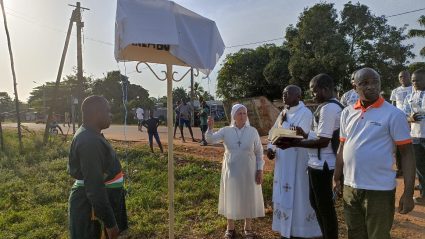 La congregazione delle “Suore missionarie dell’Incarnazione” insieme alle autorità amministrative, politiche e religiose locali, in particolare il capo di gabinetto della prefettura, Péhé Blanchard, che rappresenta il prefetto del dipartimento di Tabou, il sindaco Ouallo Jean-Luc e il curato Djiré Amores, hanno presieduto al battesimo di una strada nel quartiere Port-Bouet, all’ingresso della città di Tabou, domenica 3 dicembre 2023. La strada in questione va dalla grande via fino all’orfanotrofio Casa del Sole, situato lungo la costa, in omaggio alla fondatrice della congregazione delle “Suore missionarie dell’Incarnazione”, per le sue numerose opere di carità a favore della popolazione, in particolare dei bambini provenienti da famiglie disagiate. In questa occasione, Suor Carmela, madre generale della congregazione, ha illustrato le motivazioni legate a questa iniziativa.
La congregazione delle “Suore missionarie dell’Incarnazione” insieme alle autorità amministrative, politiche e religiose locali, in particolare il capo di gabinetto della prefettura, Péhé Blanchard, che rappresenta il prefetto del dipartimento di Tabou, il sindaco Ouallo Jean-Luc e il curato Djiré Amores, hanno presieduto al battesimo di una strada nel quartiere Port-Bouet, all’ingresso della città di Tabou, domenica 3 dicembre 2023. La strada in questione va dalla grande via fino all’orfanotrofio Casa del Sole, situato lungo la costa, in omaggio alla fondatrice della congregazione delle “Suore missionarie dell’Incarnazione”, per le sue numerose opere di carità a favore della popolazione, in particolare dei bambini provenienti da famiglie disagiate. In questa occasione, Suor Carmela, madre generale della congregazione, ha illustrato le motivazioni legate a questa iniziativa. 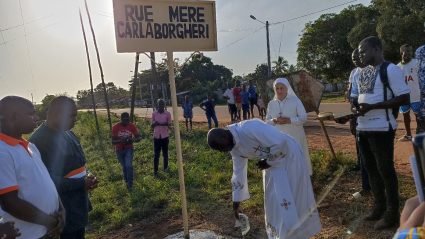 “Dal momento dell’installazione della comunità delle Suore missionarie dell’Incarnazione a Tabou nel 1997 fino al 2005, Madre Carla Borgheri ha calpestato ogni anno il suolo di Tabou. Aveva un legame particolare con la popolazione di Tabou. Era una religiosa come le altre, ma straordinaria nel suo amore per i più poveri, nella sua semplicità, umiltà e nella sua vita di preghiera”, ha spiegato. Le autorità presenti si sono congratulate per questa azione di riconoscimento.
“Dal momento dell’installazione della comunità delle Suore missionarie dell’Incarnazione a Tabou nel 1997 fino al 2005, Madre Carla Borgheri ha calpestato ogni anno il suolo di Tabou. Aveva un legame particolare con la popolazione di Tabou. Era una religiosa come le altre, ma straordinaria nel suo amore per i più poveri, nella sua semplicità, umiltà e nella sua vita di preghiera”, ha spiegato. Le autorità presenti si sono congratulate per questa azione di riconoscimento. “L’intitolazione di questa strada dedicata a Madre Carla Borgheri è per noi un momento solenne e importante. È un segno di riconoscimento per le opere e le azioni compiute dalla fondatrice delle SMI che, attraverso le sue opere qui a Tabou, lascia un’impronta su ognuno di noi. Dedicando questa strada a Madre Carla, non facciamo altro che renderle omaggio. Carla Borgheri è, per noi, un simbolo, un’icona. E saremo sempre pronti ad accompagnarvi affinché Madre Carla resti impressa nella memoria di ciascuno di noi”, ha dichiarato il primo magistrato del comune di Tabou, Ouallo Jean-Luc. Anche il capo di gabinetto del prefetto ha salutato l’iniziativa e ha espresso l’impegno del suo mandante a garantire che la “Via Madre Carla Borgheri” sia inclusa nella cartografia del paese. Nata a Novi Ligure, in Italia, il 17 febbraio 1922 e deceduta nel settembre 2006, Carla Borgheri era animata da una profonda vocazione alla carità.
“L’intitolazione di questa strada dedicata a Madre Carla Borgheri è per noi un momento solenne e importante. È un segno di riconoscimento per le opere e le azioni compiute dalla fondatrice delle SMI che, attraverso le sue opere qui a Tabou, lascia un’impronta su ognuno di noi. Dedicando questa strada a Madre Carla, non facciamo altro che renderle omaggio. Carla Borgheri è, per noi, un simbolo, un’icona. E saremo sempre pronti ad accompagnarvi affinché Madre Carla resti impressa nella memoria di ciascuno di noi”, ha dichiarato il primo magistrato del comune di Tabou, Ouallo Jean-Luc. Anche il capo di gabinetto del prefetto ha salutato l’iniziativa e ha espresso l’impegno del suo mandante a garantire che la “Via Madre Carla Borgheri” sia inclusa nella cartografia del paese. Nata a Novi Ligure, in Italia, il 17 febbraio 1922 e deceduta nel settembre 2006, Carla Borgheri era animata da una profonda vocazione alla carità.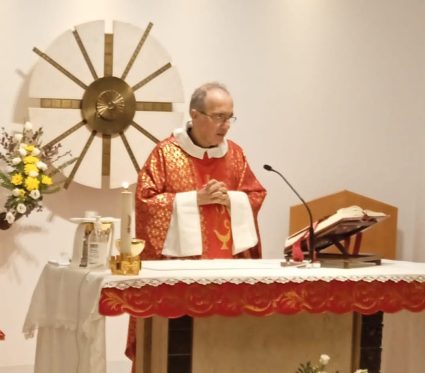
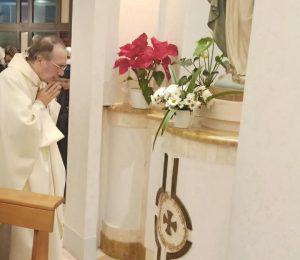
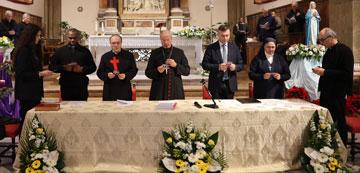 Dal nostro cuore esala un sentimento di gratitudine al Signore per tutto il bene che Egli ha compiuto per mezzo di questo suo servo fedele e buono.
Dal nostro cuore esala un sentimento di gratitudine al Signore per tutto il bene che Egli ha compiuto per mezzo di questo suo servo fedele e buono.